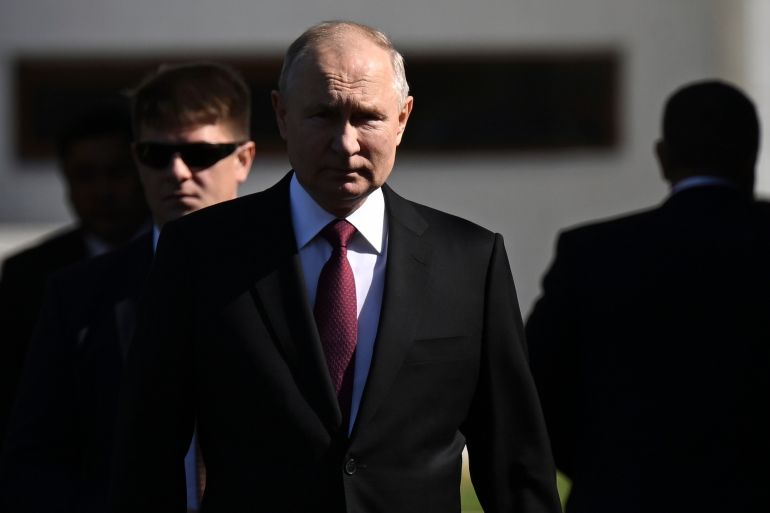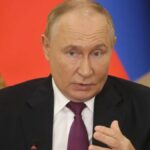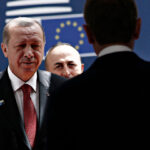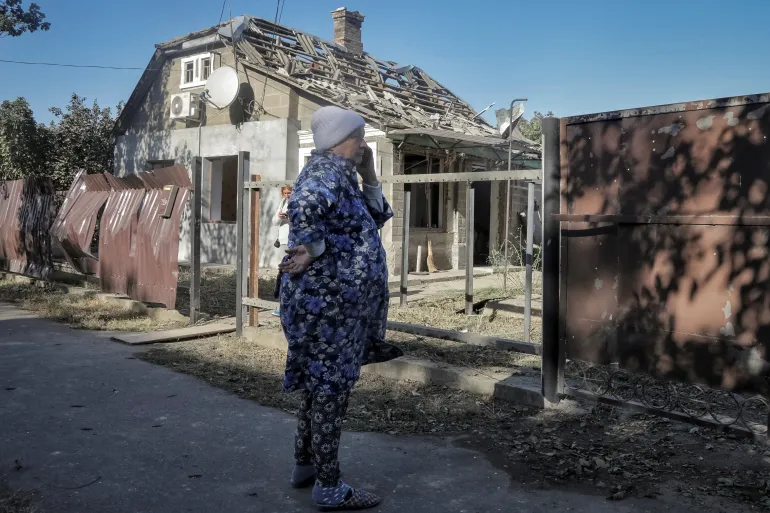As the war enters its 597th day, these are the main developments.
Fighting
- Ukraine’s Interior Minister Ihor Klymenko said the death toll in last week’s Russian missile attack on a cafe in the village of Hroza had risen to 59. “All victims are local residents. They were pensioners, medics, farmers, teachers, entrepreneurs. All were civilians. Entire families of several generations died,” Klymenko said.
- Vyacheslav Gladkov, the regional governor of Russia’s Belgorod, said three people were killed and two seriously injured when debris from a destroyed Ukrainian drone fell on their homes. A four-year-old girl was among the dead.
- Ukrainian President Volodymyr Zelenskyy said Ukrainian troops were “holding their ground” in the eastern town of Avdiivka, amid intense fighting with Russian forces.
- Ukraine’s air force said it destroyed 28 of 33 Russian drones launched from the Belgorod region to the north and from the Russian-annexed peninsula of Crimea to the south. “Enemy UAVs [unmanned aerial vehicles] were flying in different directions, so air defence was working in at least six regions of Ukraine,” the air force said on the Telegram messaging app.
- The commander of the Joint Forces of the Armed Forces of Ukraine said Ukraine had thwarted an attempt by a group of eight Russian saboteurs to cross its northeastern border in the Sumy region and attack “critical civilian infrastructure”.
https://imasdk.googleapis.com/js/core/bridge3.595.0_en.html#goog_176980757Play Video
Video Duration 02 minutes 37 seconds02:37Ukraine mandates military registration for female medical personnel
- Romania’s defence ministry said it found a “drone crater” near the country’s border with Ukraine following Russian attacks on Ukrainian port infrastructure the previous evening. Russia has stepped up attacks on Ukrainian ports and warehouses along the Danube since pulling out of a deal to allow safe grain shipments via the Black Sea in July. The Romanian discovery came as a Ukrainian military spokesperson said a Russian drone attack hit a grain warehouse and other buildings in the southern region of Odesa.
Politics and diplomacy
- Russia’s parliament will vote next week on withdrawing Moscow’s ratification of the Comprehensive Nuclear-Test-Ban Treaty (CTBT) banning nuclear tests. Leonid Slutsky, head of the Duma’s international affairs committee, said the bill’s first reading would take place on October 17 with passage expected a couple of days later. All 450 members of the Duma would support it, he added.
- NATO Secretary General Jens Stoltenberg said the defence alliance would hold its annual nuclear exercises, known as Steadfast Noon, next week. The drills involve fighter jets capable of carrying nuclear warheads but do not involve any live bombs. The training will take place over Italy, Croatia and the Mediterranean Sea.
- Russian President Vladimir Putin travelled outside Russia for the first time since the International Criminal Court (ICC) issued a warrant for his arrest over alleged war crimes in Ukraine. Putin is attending a summit of the Commonwealth of Independent States (CIS), an intergovernmental organisation made up of former Soviet republics, in Kyrgyzstan.
- The International Olympic Committee (IOC) suspended the Russian Olympic Committee (ROC) with immediate effect after the ROC recognised regional sport organisations in Luhansk, Donetsk, Kherson and Zaporizhia – four Ukrainian territories that Moscow partly occupies and announced it had annexed last year. Ukraine said the IOC’s move was an “important decision”.
- The United Nations Human Rights Council extended the mandate of Special Rapporteur Mariana Katzarova, an independent expert documenting alleged human rights abuses in Russia, by a year. Katzarova last month said that the human rights situation in Russia had significantly deteriorated since Moscow’s full-scale invasion of Ukraine in February last year, describing a “systematic crackdown” on civil society. She said Russia had adopted laws to “muzzle civil society and punish human rights activists and others for their anti-war stance”.

- The Paris tribunal prosecutor’s office said it had opened an investigation into why Marina Ovsyannikova, an exiled Russian journalist who staged a high-profile protest against the war in Ukraine, was suddenly taken ill. Christophe Deloire, director general of Reporters without Borders, said he had met Ovsyannikova, and that while she was feeling better since the incident, the possibility of poisoning could not be ruled out.
Weapons
- The Czech Defence Ministry said the Czech Republic and Denmark will jointly supply heavy military equipment to Ukraine in the coming months. The first shipment will include nearly 50 infantry fighting vehicles and main battle tanks, 2,500 handguns, 7,000 rifles, 500 light machine guns, 500 sniper rifles and equipment for electronic warfare and intelligence. The supplies will include new and modernised equipment.
- Officials from the United States Defense Intelligence Agency (DIA) showed member states of the United Nations what they said were pieces of Iranian drones recovered in Ukraine. The US mission to the UN said representatives from more than 40 countries attended the event, where debris, including parts of Iranian Shahed 101, Shahed 131 and Shahed 136 drones, were displayed.
Source: Al Jazeera















